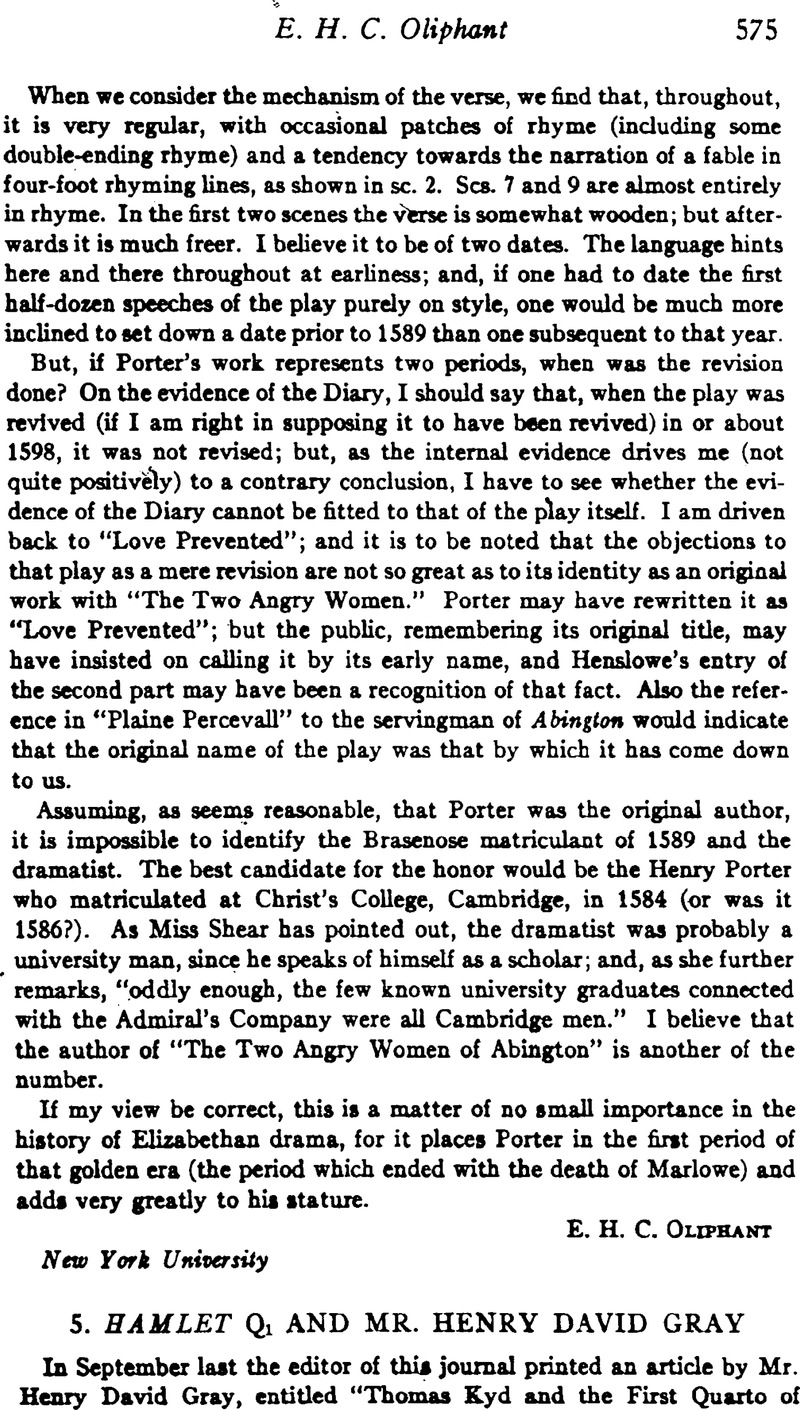No CrossRef data available.
Article contents
5. Hamlet Q1 and Mr. Henry David Gray
Published online by Cambridge University Press: 10 August 2021
Abstract

- Type
- Comment and Criticism
- Information
- Copyright
- Copyright © Modern Language Association of America, 1928
References
1 I.e., II, ii, 73, which Q8 reads: “Gives him threescore thousand crowned in anuall fee.”
1 Dr. Macaulay called my attention to the Merry Wives analogy when accepting my paper for the Mod. Lang. Renew, bot thought that my “Marcellus” theory “comes closer to absolute accuracy.” My real indebtedness was not to a brilliant scholar but to an amateur actor. For I chanced to be rehearsing a group of students in Shaw's You Never Can Tell when the man who was to play the ubiquitous waiter boasted that he knew every part in the play. He proceeded to quote speeches of other characters, and did indeed get them very well, though not nearly so accurately as he had his own lines. When I tried him in a scene where he was not on the stage he could give only the general drift with an occasional true or nearly true speech. It occurred to me that here might be an explanation of the First Quarto of Hamlet; and turning to the text I tried my suppositious thief in the part of Horatio. My theory broke down at once; but I noticed that Marcellus stood true. I tried my man as Marcellus, and the conjecture worked out to perfection. This explained the whole of Act I; for “Marcellus” was nearly letter-perfect and gave the correct Une division for his own part, while he approximated the speeches of Horatio and Hamlet but—having heard them only and not learned them from copy—he went all awry on the line division. For the scenes in which ne was not on the stage he was about as near to Shakespeare as my amateur actor was to Mr. Shaw. The explanation of the Shakespearean portions of Acts II and III was equally simple. The Second Player, who was Lucianus in the play within the play, was the culprit. As there was in Hamlet no more of Marcellus after Act I, I realised that the same actor could be used as the Second Player.
2 Here I made an unfortunate reference to “my hinseck,” laying that I was in this “like the father of Joseph Vance.” Professor Hubbard, in the M. L. Notes criticism to which Mr. Wilson refers, was evidently irritated by this “hinseck,” and I learned from that not to try to be jocular when writing about Shakespeare. But so far from meaning it as solemnly arrogating to myself a vast amount of credit, it was the absurdity of old Vance in making a great to-do over his paltry find that I referred to. I thought that some apology was appropriate for elaborately proving a point that would be evident to anyone who would examine the texts with this in mind.
3 His essay was not in the Stanford library, and I found no reference to it in the later writers who were.
4 Perhaps I should not have dismissed that of English Ambassador so summarily. My statement might lead one to suppose that Mr. Wilson had been more hasty in this assignment than he was, and I would not, of all things, be unfair. In saving that it “was an unfortunate suggestion for Mr. Wilson, as ‘Voltemar’ enters with the English ambassadors at the end of the play,” my point was that the stage direction, “Enter Voltemar and the Ambassadors from England” separates him from them and by no means makes him one of them. The Marcellus-Second Player actor, used ss a supernumerary in the final scene, identified the man from whom he had got the Voltimand speech as coming in at the final filling up of the stage, and was glad to have a name to set down. It is another proof that he did not assume the role of Voltimand, for there is no improvement in his report after the “Voltemar” entrance.


